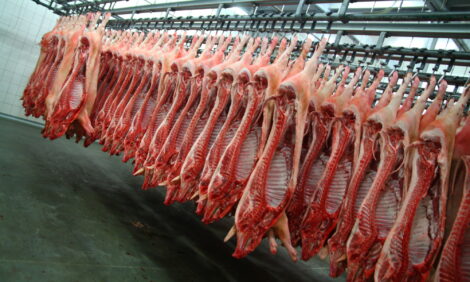



Post-Weaning Diarrhea and Mortality Caused by <i>E. coli</i>
By University of Guelph Researchers, Ontario - Since the mid-1990’s, Ontario pig farmers have experienced outbreaks of disease in weaned pigs caused by E. coli. Losses due to diarrhea and mortality have been extensive on many of the affected farms. This article looks at studies in Ontario into this problem.Information provided courtsey Ontario Pork

|
A survey of farms suffering from this disease was conducted by a team of veterinary researchers led by University of Guelph Prof. Bob Friendship, Department of Population Medicine, in the summer of 1998. In this study, it was noted that resistance was developing against the commonly used antibiotics. And despite a wide variety of treatment approaches, the disease continued to be a problem. Friendship’s team set out to develop and evaluate alternative methods of control so that farmers could avoid the use of antibiotics.
Techniques that have been tested include oral and intramuscular vaccines for piglets and rations containing antibodies against E.coli. The latter was produced by vaccinating chickens against E.coli and incorporating the egg-yolk into a powder to be mixed with starter feed.
These approaches have all proven to be ineffective in controlled trials.
The researchers are now evaluating the use of probiotics and prebiotics to solve this problem. Probiotics are live beneficial bacteria fed to pigs, so that these “good” bacteria compete with Ecoli (“bad” bacteria) in the gut. Prebiotics are feed components that pass into the bowel and provide food for the beneficial bacteria. Pigs with a healthy microflora may be resistanant to a take-over by E.coli.
Preliminary trials have not been successful, proving that post-weaning E.coli diarrhea is a complex and difficult disease to control. Work is continuing.
Report Summary
E. coli causing diarrhea and mortality in weaned pigs has been identified as an emerging problem in Ontario. The purpose of this research was to survey Ontario swine operations to determine what obvious risk factors are associated with the occurrence of this disease. A second objective was to identify the organism and characterize it as far as enterotoxin production and antibiotic resistance. An additional goal was to determine if vaccination could prevent or control the disease problem in the field.Fifty farms were visited in the summer of 1999. Producers were asked to fill out an extensive survey which was used to evaluate management and housing factors which have been considered as potential contributors to the emergence of post-weaning diarrhea. For example, farms were categorized as to age at weaning, whether pigs were co-mingled from multiple sources, what antibiotics were included in the feed, and whether the weaner facilities were operated on an all-in/all-out manner or as a continuous flow operation. Rectal swabs were taken from scouring pigs and normal pigs and these swabs were plated on agar in an effort to isolate E. coli. All pure cultures of hemolytic E. coli were further typed and antibiotic susceptibility analyzed. Two farms were identified with a chronic problem of post-weaning E. coli diarrhea and asked to participate in a vaccination trial.
The results of the survey indicated that there are no obvious risk factors in that the disease is just as likely to occur on a farm that practices early weaning as a herd that weans late, and similarly all-in/all-out management systems are no less likely to have scouring than continuous flow systems. E. coli diarrhea is a problem in all types of housing and management. The most common E. coli isolated from herds with a severe problem was K88ac, with three enterotoxins (STa, STb, LT). Mortalities ranged from 2-3% in control farms and case farms prior to infection. Case farms after outbreaks of K88 E. coli experienced mortality rates of between 8 and 30%. The main clinical signs reported from the case farms were sudden death (73%), profuse watery diarrhea (60%), mild diarrhea (40%), and vomiting (20%).
Control of this problem has been difficult. Farmers reported trying on average approximately 6 different treatment strategies including high levels of antibiotics. On two farms, controlled trials were conducted to evaluate the efficacy of a live oral vaccine and a killed intramuscular bacterin. In both farms, pigs were vaccinated 1 week before weaning and again at the time of weaning. All antibiotics and antimicrobial products were removed from the feed and water during the study. Neither treatment provided improved protection compared to the untreated control pigs.
The conclusion of these experiments was that the E. coli challenge occurred so soon after weaning on both these farms that vaccination had no time to stimulate an adequate immune response. Therefore, if vaccination is going to be successful methods to postpone the bacterial challenge such as improved sanitation and hygiene are necessary or possibly a technique to extend the period of passive protection is needed.
For more information, contact Dr. Bob Friendship at 519-824-4120.
Researchers
Robert Friendship - Department of Population Medicine, University of Guelph, Guelph, OntarioRocio Amezcua - Department of Population Medicine, University of Guelph, Guelph, Ontario
Cate Dewey - Department of Population Medicine, University of Guelph, Guelph, Ontario
Carlton Gyles - Department of Pathobiology, University of Guelph, Guelph, Ontario
Gaylan Josephson - Animal Health Laboratories, University of Guelph, Guelph, Ontario
Beverley McEwen - Animal Health Laboratories, University of Guelph, Guelph, Ontario
This work was sponsored through a grant from the Ontario Research and Development Program funded by Agriculture and Agri-Food Canada and administered by Agricultural Adaption Council as well as the University of Guelph-OMAFRA Animal Research Program and Ontario Pork.








